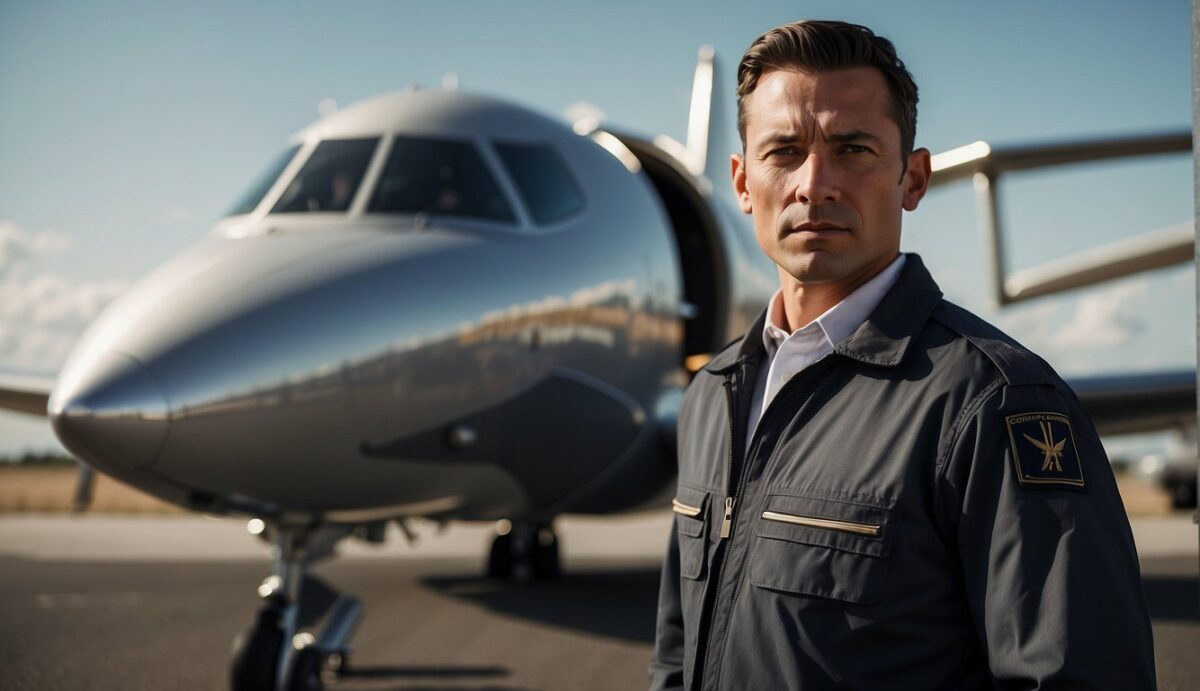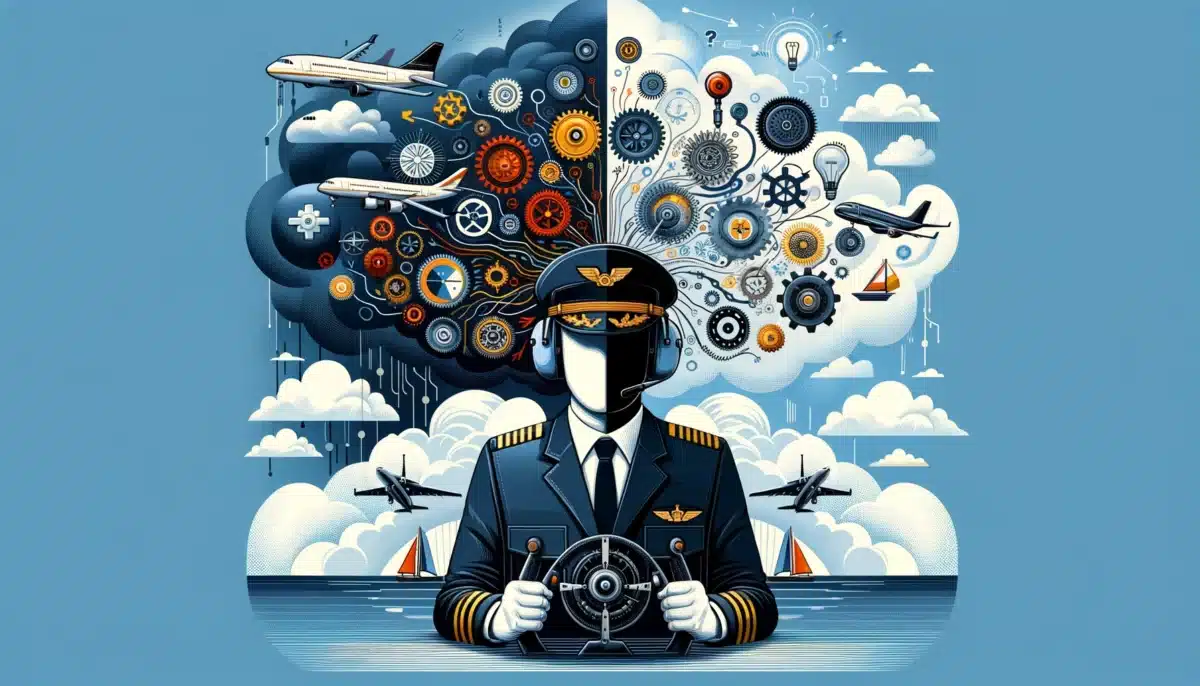The cockpit is a realm where both mental acuity and physical stamina are put to the test, demanding a unique blend of personality traits for those at the helm. This exploration into the “ideal pilot profile” delves deep into the characteristics, communication prowess, personality types, rigorous training demands, and emotional fortitude essential for aviation excellence.
Cracking the code to the optimal pilot persona unveils a guide for spotting those poised for success in the skies. Whether you’re dreaming of donning the pilot’s cap or in the business of recruiting aviation talent, these insights offer a valuable gauge for assessing potential and compatibility.
As we chart this course, we’ll provide a detailed map of the psychological landscape navigated by successful pilots. Prepare for an enlightening journey into the heart of what makes a pilot not just competent, but exceptional.

Table of Contents
Pilot Personality Type Traits
Important Pilot Personality Traits for Success
- Goal-oriented – Successful pilots need to have a clear direction and motivation to achieve flight objectives. Being focused on specific outcomes helps pilots effectively accomplish tasks.
- Analytical – The ability to evaluate complex situations and calculate risks is crucial for pilots. They need to be able to process many variables to make informed decisions.
- Communicative – Pilots must clearly convey instructions to passengers and crew. Strong communication skills also facilitate coordination with air traffic control.
- Decisive – When facing emergencies or other scenarios that require quick judgement, pilots need to act decisively. Indecisiveness can negatively impact outcomes.
- Emotionally Stable – Remaining calm under pressure is vital for pilots. They must manage stress effectively to maintain focus in challenging situations.
- Assertive and Confident – Pilots require the confidence and authority to make tough calls and manage crews. Self-assuredness translates into clear leadership.
Type A vs Type B Personalities
There is often debate around whether Type A or Type B personalities make the best pilots.
Type A personalities tend to be competitive, organized, and have a strong sense of urgency. Their need to achieve goals can act as a powerful motivator.
Type B personalities are more relaxed, creative, and adaptable. Their ability to “go with the flow” helps them handle unexpected situations.
Ideally, pilots should have a blend of Type A and B traits. Competitive spirit can provide motivation to excel, while a calm demeanor equips pilots to handle stress. Well-roundedness is key.
The Role of Communication
As a pilot, communication plays a vital role in ensuring the safety and smooth operation of aircraft. Effective communication helps foster trust and practical cooperation among crew members and passengers.
In this section, we’ll explore the importance of communication in the aviation sector, focusing on two essential subtopics: Communicating with Crew and Passengers, and Dealing with Pressure and Stress.
Communicating with Crew and Passengers
Pilots need excellent communication skills to work well with their crew and interact with passengers. An outgoing personality often helps with socializing among the diverse group of people encountered in the aviation industry.
A pilot must be able to convey information to colleagues clearly and straightforwardly, especially when reacting to any potential dangers or issues that may arise while flying.
Maintaining persistent communication is vital in fostering trust and competence between crew members. This contributes to promoting a sense of confidence and dutifulness among the entire team, ensuring the safety and satisfaction of all passengers onboard the aircraft.
Dealing with Pressure and Stress
Pilots should ideally be adept at handling high-pressure situations that can occur during flights. The excitement of flying can sometimes be accompanied by anxiety or stress, making it essential for pilots to possess strong communication skills to navigate these challenges.
During times of increased pressure or stress in the aircraft, clear and constructive communication helps maintain a calm and focused atmosphere among the crew. Moreover, conveying accurate and timely information to the passengers during transportation can reduce their anxiety levels and promote a sense of safety and trust.

Personality Types and the Big Five Theory
The Big Five personality theory, also known as the Five-Factor Model, is a widely accepted framework for understanding personality.
It consists of five dimensions that can help explain variations in human behavior and tendencies: Extraversion, Neuroticism, Openness, Agreeableness, and Conscientiousness.
In the context of choosing a career, each of these traits might play a role in determining whether someone will make a good pilot.
Extraversion
Extraversion refers to the degree to which someone is outgoing, sociable, and assertive. A high score on this dimension might suggest that the individual enjoys connecting with others and working in a team environment.
While pilots often work in a team setting with air traffic controllers and co-pilots, they also spend a significant amount of time in solitude in the cockpit. Therefore, a balanced approach where a pilot exhibits both extraversion and introversion traits might be ideal.
Neuroticism
Individuals who score high in Neuroticism tend to experience negative emotions, such as anxiety, vulnerability, and depression, more frequently and have a more challenging time coping with stress.
Pilots must deal with high-stress situations daily and should have the capacity to remain calm under pressure. So, a lower score on neuroticism might better suit a pilot’s role.
Openness
Openness relates to a person’s willingness to experience new things, their creativity, and their intellectual curiosity. Pilots are constantly confronted with new experiences, including different flight routes, regulations, and aircraft types.
A higher score on openness might suggest that someone will adapt well to the ever-changing nature of aviation and develop a strong skill set in this field.
Agreeableness and Conscientiousness
Agreeableness is a measure of an individual’s tendency to be cooperative, empathetic, and kind. Conscientiousness, on the other hand, looks at how organized, disciplined, and careful a person is.
Both traits are essential for a pilot’s job as they often need to collaborate and communicate effectively with their team to ensure flight operations’ success.
Being responsible and attentive to details is crucial to maintaining safety during flights. A higher score on both agreeableness and conscientiousness could be an indicator of an individual’s potential to excel as a pilot and maintain harmonious relationships with their crew members.

Popular Myers-Briggs Personality Types for Pilots
In this section, we will explore some of the popular Myers-Briggs personality types that are often associated with successful pilots.
ISTJ and ISFJ Personalities
ISTJs and ISFJs are known for their strong sense of responsibility, dedication, and practical problem-solving skills. These traits make them ideal candidates for piloting positions.
ISTJs, in particular, are detail-oriented and excel at managing comprehensive systems, making them well-suited for tasks like pre-flight checks and maintaining safety procedures.
ISFJs also have strong observational skills and place great importance on ensuring the well-being of others. This makes them attentive to passengers and their fellow crew members, helping to create a safe and pleasant flight environment.
ENTP and ESTP Personalities
On the other hand, ENTP and ESTP individuals bring a unique set of strengths to the piloting profession due to their adaptability, quick thinking, and resourcefulness. They are known for their ability to look at situations from different perspectives and come up with creative solutions.
ENTPs are skilled at analyzing complex systems and identifying patterns, which can be incredibly helpful in troubleshooting aviation-related issues. Their innovative mindset and ability to think outside the box may contribute to advancements in the aviation industry.
ESTP personalities have a talent for remaining calm under pressure and making difficult decisions quickly. This is a crucial attribute for pilots who need to maintain control of the situation, particularly when facing an emergency.
ESTPs are generally confident and assertive, making them effective communicators, a valuable skill for coordinating with air traffic control and crew members.
Emotional Stability and Mental Health
Dealing with Unwanted Feelings
Being a pilot requires a high level of emotional stability, as they often need to make practical decisions under pressure. Managing anxiety and excitement is crucial for ensuring the safety of both passengers and crew.
Pilots must be self-sufficient in dealing with their emotions and avoiding vulnerability that may impact their ability to perform. At the same time, they should be able to acknowledge moments of failure and modesty, understanding that it is a natural part of learning and growth.
Emotional stability is an essential trait for pilots, as it allows them to maintain a calm, even-tempered demeanor while facing stressful situations. Pilots should have a strong sense of achievement-striving and self-discipline.
These qualities enable them to remain focused and committed to their responsibilities, even when faced with challenges.
Mental Health Support in Aviation
In the aviation industry, it is crucial to address mental health concerns among pilots. The Federal Aviation Administration (FAA) requires airline pilots to undergo medical exams with an Aviation Medical Examiner (AME) periodically, depending on their type of flying and age.
These medical exams aim to evaluate pilots’ mental health and fitness to fly. The process ensures that pilots are emotionally stable and less reactive to stress, making them more capable of handling the psychological demands of their profession.
Pilots, well, people in general, may be hesitant to discuss their mental health openly because they may perceive it as a sign of weakness or a threat to their career.
As a result, it is essential to create a supportive environment that emphasizes the importance of mental health and encourages pilots to seek help when needed.
Final Thoughts
There are particular mixes of technical proficiency, personality traits, training, experience and soft skills that tend to produce truly skilled pilots. However, there are diverse paths to aviation success.
Passion, perseverance and a methodical approach to building knowledge are universal requirements. With the right preparation, candidates from all backgrounds can thrive as pilots.